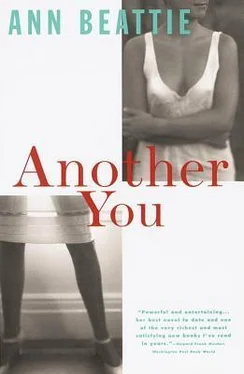Ann Beattie - Another You
Здесь есть возможность читать онлайн «Ann Beattie - Another You» весь текст электронной книги совершенно бесплатно (целиком полную версию без сокращений). В некоторых случаях можно слушать аудио, скачать через торрент в формате fb2 и присутствует краткое содержание. Год выпуска: 2014, Издательство: Vintage Books, Жанр: Современная проза, на английском языке. Описание произведения, (предисловие) а так же отзывы посетителей доступны на портале библиотеки ЛибКат.
- Название:Another You
- Автор:
- Издательство:Vintage Books
- Жанр:
- Год:2014
- ISBN:нет данных
- Рейтинг книги:5 / 5. Голосов: 1
-
Избранное:Добавить в избранное
- Отзывы:
-
Ваша оценка:
- 100
- 1
- 2
- 3
- 4
- 5
Another You: краткое содержание, описание и аннотация
Предлагаем к чтению аннотацию, описание, краткое содержание или предисловие (зависит от того, что написал сам автор книги «Another You»). Если вы не нашли необходимую информацию о книге — напишите в комментариях, мы постараемся отыскать её.
Another You — читать онлайн бесплатно полную книгу (весь текст) целиком
Ниже представлен текст книги, разбитый по страницам. Система сохранения места последней прочитанной страницы, позволяет с удобством читать онлайн бесплатно книгу «Another You», без необходимости каждый раз заново искать на чём Вы остановились. Поставьте закладку, и сможете в любой момент перейти на страницу, на которой закончили чтение.
Интервал:
Закладка:
Something has been wrong with every part of me since his death. I say “his” because today even the name is too painful to write. Yet I loved him no more than my other children, or at least not until the moment when it was clear he had died .
What can you think of this long exile? My separation from house, from children, from you? Perhaps that is what you spared me with the blank piece of paper, trying to nudge me back to reality with images instead of words .
Ever ,
M .
9
MARSHALL SAT ON the side of his bed, dialling Evie’s hospital room. He spoke quietly, conscious of McCallum sleeping at the end of the hallway. Sonja had left for work, and would go from there to the hospital to see Evie, she had told him, whispering herself, leaning forward to kiss his forehead, her hair falling forward to tickle his nose, a haze of perfume mesmerizing him — the perfume she’d begun to squirt underneath her hair. A very citrusy perfume that made him think of orange juice, breakfast, the blueberry pancakes he’d imagined not so long ago, the conversation he and Sonja had had about summer.
Sonja thought it was best that Evie have private nurses. She had discussed it with him just before falling asleep and he’d quickly agreed, embarrassed not to have thought of it himself. Unless something really demanded his attention, he didn’t often think things through, and somehow the hospital had seemed so functional, the staff so busy and so effective that, as was his way, he had assumed everything would go smoothly. Sonja had had to explain to him that this was not so: the overworked nurses would ignore blinking lights as long as possible; patients who didn’t complain were likely to be ignored. And then the unarguable: “You know if the shoe were on the other foot, Evie would do everything in her power to see you had the finest care. She always did.” Of course she had: she had taken care of everyone in his family, uncomplainingly, devotedly. It pained him to remember how hard she had worked, and how patient she had always been, humming softly as she dusted, transported by music on the radio as she hung out the wash to dry. That was how he thought of Evie: as constantly busy. In fact, he realized guiltily, that was one of the many reasons why it was always so difficult to go to see her: his inability to reconcile the active, upbeat person of the past with the relatively silent, passive person she had become. Yet when he woke up that morning, the events of the night before still alarmingly clear in his mind, he had reached for the phone as he had once reached for Evie’s hand, rationalizing his need to connect with her — even if it was a one-way conversation — as her needing him. Incredible to think of her now, incapacitated, the songs unhummed, thoughts allowed to pass by unstated, like little fish sliding through holes in a net. How little thanks he and Gordon had ever expressed, how withholding his father had been. The nurse picked up the phone on the second ring. As he spoke to the nurse, he was surprised to hear in his own voice some of his father’s brusqueness: he was glad she had had a good night; he was happy to hear that she had tested negative for pneumonia; if the nurse would be so kind as to hold the phone to her ear … oh, wonderful that she was reaching for the phone with her good hand. Absolutely wonderful (but, of course, to be expected).
What he said to her was more like a nuzzle than a real attempt to communicate; his words were muffled, and he could feel them nudging against her, sound rather than content — because what to make of the chaos of Cheryl and Livan and McCallum, where to begin even if Evie were well and able to take it all in? “Sonja told me to get you round-the-clock nurses,” he said. “I hope they make things a little easier. You always …” She always what? Who, or what, always did anything? “You did everything you could, you know. I don’t think boys express themselves as easily as girls. When Gordon and I were young, I mean. I mean, we trusted you. That’s a form of appreciation in boys, I think, but you probably wish we’d just thanked you more often. I forget to thank Sonja. I … Jesus, it sounds like I’m accepting an Academy Award and coming apart, dying to tell everyone about the person behind the scenes who made it all possible. It was you. I called … You know what I mean. We loved you, but we weren’t very effective about communicating it. I don’t seem to have gotten better at it with age. We love you, I mean. I didn’t mean to say loved.”
“Hello,” the nurse said. “She’s put the telephone on the pillow. I think she’s a little tired. She’s whispering that she loves you.”
“I wasn’t very good about communicating,” he said.
“You have a nice day,” the nurse said.
“Cheryl Lanier, Livan Baker, Jack McCallum,” he said, testing to see if the nurse was listening at all.
“I’ll give her everyone’s good wishes,” the nurse said. “I can see your call really cheered her up.”
When he hung up, he thought: I’m laughing because I’m nervous . What the nurse said was not really funny. What’s happened to Evie is so awful I can’t focus on it. What did I say to her? What did I say?
Cheryl Lanier was not in class. A girl named Sophia, twirling the end of her cellophane-pink braid, was sitting in the seat Cheryl usually occupied, her tongue working a Chiclet into a pearl she would probe with mounting irritation as the hour wore on. The package of Chiclets lay on her table, along with a package of Marlboro Lights. As he looked at her, she moved her fingers toward the cigarette pack and immediately withdrew them — the tentative gesture he remembered Sonja sometimes making a few seconds after plugging in an iron. In spite of her slatternly appearance — bleached denim overalls covering an enormous striped shirt wadded under her armpits, Doc Martens worn with no socks, one shoe laced, the other unlaced, a wrist full of silver bracelets, a red handkerchief tied in the middle of her bangles, a stud piercing her nose — Sophia Androcelli was not unalert or unintelligent. Her papers had been excellent — late, but excellent — and on the rare occasions he bothered to read the campus newspaper, he had seen several stingingly accurate letters to the editor signed with Sophia’s name, protesting wasteful monetary extravagances by the administration and questioning the value of legislating political correctness. She usually sat in the last seat in the last row, to the far left — she had become one of his markers, he now realized; he had gotten into the habit of seeing who was bracketing the corners of the first and last rows, eyeballing the class quickly, as if he were registering the correct positioning of the bases at a baseball game — but today she was slumped in Cheryl Lanier’s seat, and in the last row her own chair sat empty. The chair to the far right of the row was, as usual, occupied by Judith Levine, a woman in her forties who had returned to college to finish the degree she’d failed to get when she dropped out to become a flight attendant. Front row left was Dominic Ruiz, an ass-kisser of the first order, and front row right Bill Snyder, a round-faced boy with a peculiar, dog-ear hairstyle that made him look like Lucy in “Peanuts.”
Marshall had nodded to the class, then set his books and his clipboard with the typed lecture notes he probably would not consult on the lectern, also placing a stack of papers to be returned on the desk he never sat behind, preferring to stand as he spoke — when Ashton Freer opened the door, beckoned for Marshall to come outside, then closed the door again with a delicate click Marshall felt sure would be the last bit of delicacy of the day. Freer was of medium height, but disturbingly thin. As usual, he was dressed in creased trousers, a white shirt, and a cardigan sweater, with a rolled tie, instead of a handkerchief, forming a small lump in his shirt pocket. On his wrist was a medical bracelet. Peering into Freer’s shirt pocket, Marshall saw that the color of today’s tie was navy blue. Before Freer spoke, Marshall said, “This is about McCallum.”
Читать дальшеИнтервал:
Закладка:
Похожие книги на «Another You»
Представляем Вашему вниманию похожие книги на «Another You» списком для выбора. Мы отобрали схожую по названию и смыслу литературу в надежде предоставить читателям больше вариантов отыскать новые, интересные, ещё непрочитанные произведения.
Обсуждение, отзывы о книге «Another You» и просто собственные мнения читателей. Оставьте ваши комментарии, напишите, что Вы думаете о произведении, его смысле или главных героях. Укажите что конкретно понравилось, а что нет, и почему Вы так считаете.












